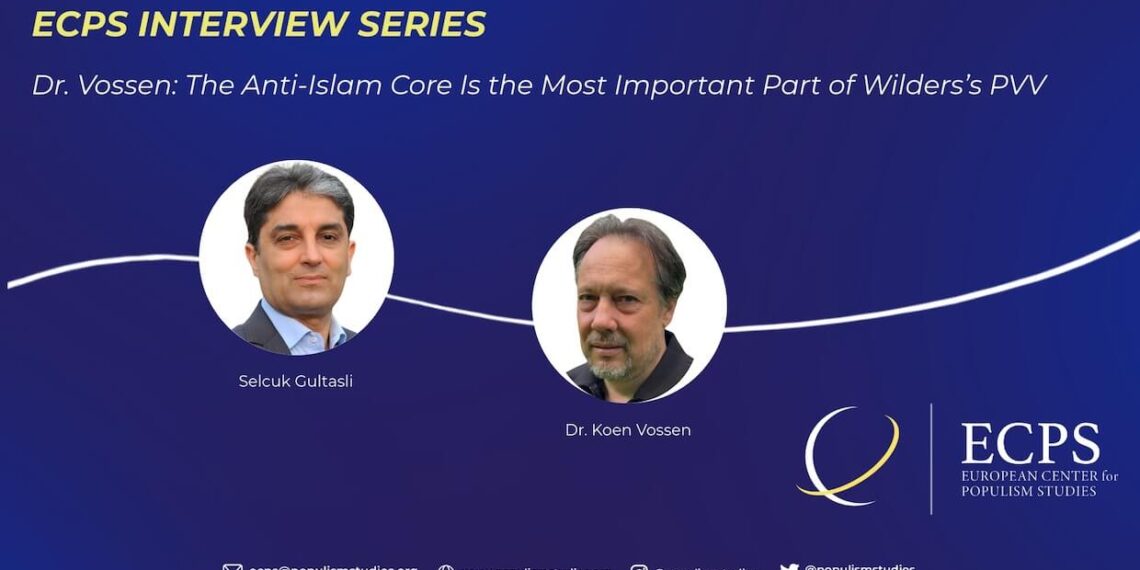In an in-depth interview with the ECPS, Dr. Koen Vossen, political historian and lecturer at Radboud University, analyzes the ideological evolution and endurance of Geert Wilders’s Party for Freedom (PVV). He stresses that “The anti-Islam core is absolutely the most important part of this party,” noting that despite tactical moderation, its fundamental worldview remains unchanged. According to Dr. Vossen, the PVV’s “one-man structure” and lack of internal democracy make it both flexible and fragile. Wilders’s “clash of civilizations” narrative, rooted in his early attachment to Israel, continues to shape his politics. As Dr. Vossen observes, media normalization, cultural anxieties, and declining institutional barriers have allowed the PVV to become a lasting—though polarizing—force in Dutch politics.
Interview by Selcuk Gultasli
In a wide-ranging interview with the European Center for Populism Studies (ECPS) following the Dutch general elections of October 29, 2025, Dr. Koen Vossen, a political historian and lecturer in political science at Radboud University, offers a nuanced analysis of the ideological evolution, strategic positioning, and organizational structure of Geert Wilders’s Party for Freedom (PVV). Dr. Vossen, a leading scholar on Dutch populism and right-wing movements, situates the PVV within a broader European radical-right context while emphasizing its distinctly Dutch trajectory.
As Dr. Vossen underscores, “The anti-Islam core is absolutely the most important part of this party.” While the PVV has, over time, expanded its platform to include positions on welfare, housing, and law and order, these remain secondary to its central ideological fixation. The PVV, he explains, “is really basically one man… It is purely a matter of what Wilders wants, what he does, and what he likes.” This personalization of power, combined with the party’s lack of internal democracy, explains both its tactical flexibility and its chronic difficulty in governance.
Dr. Vossen traces Wilders’s ideological consistency to what he calls a “clash of civilizations” worldview, deeply informed by his “special connection with Israel.” Having worked on a kibbutz as a young man, Wilders came to see Israel as “the main buffer against Islamization.” This perspective not only anchors the PVV’s foreign policy but also shapes its domestic narrative of cultural defense. According to Dr. Vossen, Wilders’s “absolute core ideology is this anti-Islam ideology,” while his steadfast pro-Israel stance serves as both a symbolic and programmatic pillar in PVV discourse.
On the domestic front, Dr. Vossen attributes the PVV’s durability to a combination of structural and contingent factors: the decline of pillarized institutions, the fragmentation of the Dutch party system, and the normalization of far-right rhetoric through mediaamplification. “Over the last ten years,” he notes, “we’ve seen the clear emergence of a very right-wing media… strongly conservative and very much anti-left. ‘Left’ as a word, as a concept, has almost become an insult in the Netherlands.” The weakening of social intermediaries and the culturalization of political conflict, he argues, have made space for a stable radical-right electorate of roughly 30%.
Despite periodic moderation—what Wilders once called putting his ideas “in the freezer”—Dr. Vossen believes the PVV’s ideological substance remains intact. Even temporary participation in government, he argues, only suspends rather than transforms its radicalism. The 2025 elections, he concludes, show both the limits and persistence of Dutch populism: a movement still revolving around one man, one message, and one enduring enemy.


